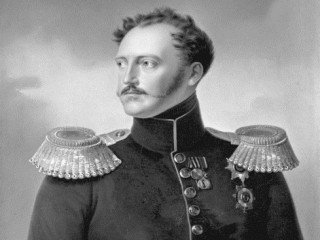
Nicholas I Of Russia biography
Date of birth : -
Date of death : 1855-03-02
Birthplace : Gatchina, Russia
Nationality : Russian
Category : Historian personalities
Last modified : 2012-01-25
Credited as : czar, statesman, House of Romanov
The Russian czar, statesman, and autocrat Nicholas I (1796-1855) reigned from 1825 to 1855. During his reign Russian 19th-century autocracy reached its greatest power.
The third son of Czar Paul I, Nicholas was tutored in political economy, government, constitutional law, jurisprudence, and public finance. He learned to speak Russian, French, German, and English, and he studied Greek and Latin. Nicholas showed great aptitude for the science of warfare, especially military engineering, and became an expert drillmaster. His education ended in the middle of 1813. In 1814 Nicholas joined the army, for which he retained a strong affection throughout his life. On July 1, 1817, he married Charlotte of Prussia, daughter of King Frederick William III. Nicholas took no part in the administration of public affairs during the reign of his brother Alexander I. He was put in charge of a brigade of the guards and was inspector general of army engineers.
Paul I's second son had renounced his right to the throne, and on Alexander's death in 1825 Nicholas became czar. But the confusion over the succession led to the Decembrist Rebellion of 1825. This uprising was a shock to Nicholas, for it involved the army, especially the guards, whom the Czar regarded as the backbone of the throne. Nicholas supervised the investigation of the conspiracy. He labeled the Decembrists "a handful of monsters." In spite of numerous secret committees and proposals, no significent reforms were enacted. The general attitude of Nicholas is pointed out by his remarks on the emancipation of serfs. "There is no doubt that serfdom, in its present form, is a flagrant evil which everyone realizes," Nicholas proclaimed in the state council on March 20, 1842, "yet to attempt to remedy it now would be, of course, an evil even more disastrous."
Nicholas's rigid conservatism, his fear of the masses, and his desire to preserve autocracy and to protect the interests of the nobility hindered reforms. Thus, his regime became a dictatorship.
Nicholas's conservative views determined Russian foreign policy, over which he exercised personal control. His opposition to the principle of national self-determination, which spread throughout Europe, caused him to come into conflict with every democratic and liberal movement in England and on the Continent. His aggressive and unpredictable foreign policy in Asia and the Near East annoyed the European powers and caused suspicion. His bloody suppression of the Polish insurrection of 1830-1831 and the destruction of Polish autonomy enhanced Nicholas's unpopularity.
Under Nicholas I the first railway between St. Petersburg and Tsarskoe Selo (Pushkin), 17 miles long, was opened to the public in 1837. By the end of his reign Russia had 650 miles of railways. Some progress was also made with river shipping.
It is a paradox that during the absolutism of Nicholas I the golden age of Russian literature occurred. Of the authors whose work does not extend beyond the chronological limits of Nicholas's rule, the most prominent were Aleksandr Pushkin, Mikhail Lermentov, Aleksei Koltsov, and Nikolai Gogol. In addition, intellectual movements emerged to debate the destiny and the contributions to civilization of Russia. The two best-known movements were the Westerners and the Slavophiles. The Westerners were primarily Russian humanitarians. They admired European science and wanted constitutional government, freedom of thought and of the press, and emancipation of the serfs.
Slavophilism of the 1840s was a romantic nationalism that praised Russian virtues as superior to those of the decadent West. The Orthodox Church, according to this movement, was the source of strength in the past and Russia's hope for the future. The Slavophiles criticized the Westernization of Peter the Great as an interruption in the harmonious course of Russian history.
Certainly, Nicholas's defeat in the Crimean War exposed the military and technological backwardness of Russia to the world. He was aware of the failure of his reign, and whatever illusions he might have cherished were dispelled by the Crimean War. He died in St. Petersburg on March 2, 1855.
















